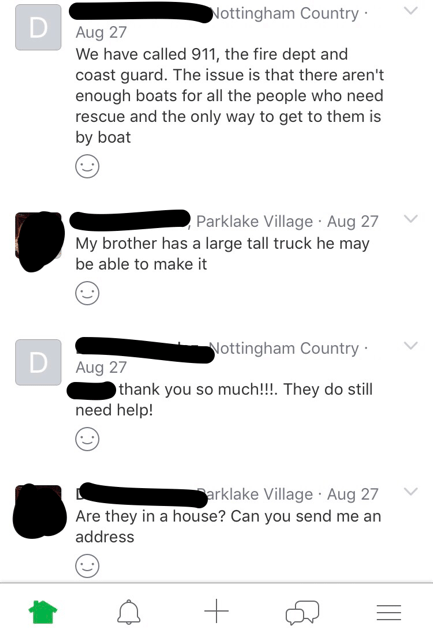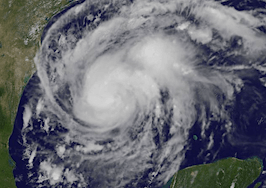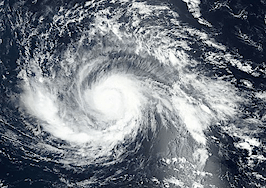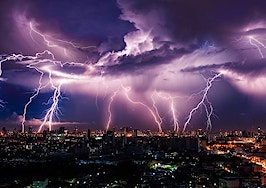- You don't need to wear an S on your chest to make an impact; just offer advice, direction and resources when you can.
- Your reaction when disaster strikes could make or break your client relationships.
I didn’t sleep a wink on the night of Aug. 27. My racing heart, a knotted stomach and restless nerves kept me company as I stared at the weather radar for hours on end; Hurricane Harvey was pummelling my city, and there was nothing anyone could do but wait … and wait … and wait some more.
In the hours, days and weeks that followed, I learned firsthand that the real estate agent plays a very important role in the recovery process that happens after a disaster — but whether that role is a help or a hindrance is dependent upon the agent’s attitude, professionalism and capacity for compassion.
Before the hit
My husband and I have never lived in a house together. We came home to a small, roach-infested studio after we married; then, before our daughter was born, we upgraded to a much nicer, bigger two bedroom apartment. Lovely as it was, we still wanted a house.
I wanted the space for my daughter to play freely. I wanted the backyard for my dog to run around. I wanted the sunlight to finally stream in from every direction. I wanted to bring the groceries in without having to make 10 trips up and down the stairs. I wanted everything an apartment just couldn’t give me.
Though we still aren’t in a position to buy yet (we are working on getting there!), we decided that we couldn’t wait any longer to live the single-family lifestyle and were set on renting a full house to ourselves. We decided to work with an agent who was referred to us to ensure a smooth process. (It’s common for renters of both apartments and houses in the Houston area to hire an agent.)
Then we found it. The house we’d been looking for. It had everything — the backyard, the natural light, the study, the space. And we weren’t the only ones who wanted it: the house had been on the market for less than a day, and we already had major renter competition.
Naturally, I submitted our application and fees as quickly as possible, and wrote a sincere “love letter” to the owners.
With fingers crossed, we waited.
Good news came the following day when our agent said the homeowners loved the letter and decided to choose us.
That was Friday, Aug. 25 — the day before Hurricane Harvey made landfall in Rockport, Texas.
Waiting in a flooded limbo
It was a strange feeling. The excitement of getting approved for our new rental house was quickly overshadowed by worry. Flash floods, tornados and power outages were happening just north, south, east and west of our apartment complex — it was like Harvey was saving us for last. And it did.
When my city was finally flooded to capacity, the reservoir behind my apartment — the Barker Reservoir — began spilling over. As did the Addicks Reservoir just north of us. To stop the dams from breaking, the Army Corp of Engineers began doing controlled water releases on the morning of Monday, Aug. 28.
Our parking lot was flooded by sunrise. Thankfully, my sister came to rescue us in a truck.
The shock of seeing and feeling water rising in places where it shouldn’t be is indescribable. We loaded the vehicle with food, water and other supplies, and with each trip up and down the stairs, the water rose noticeably higher up my legs.
It wasn’t until we were safe at my parents dry house that my husband and I started to think about whether signing the new lease was a smart idea. Our future neighborhood was included in the list of areas that would be flooded by the reservoir release, after all, and we didn’t want to be homeless when all of this was over.
Does business always have to be just business?
We held off on signing because we wanted to see if the house would flood, but our agent urged us not to wait as more people were inquiring about the house. The pressure was too much at this moment.
The homeowners had already approved us — they liked us — but now it felt like my agent was saying they’d drop us for someone else if we didn’t immediately sign the paperwork.
In this stressful circumstance, it would have been nice to have received a more cushioned real estate blow. Rather than posing ultimatums and seemingly aggressive suggestions, my agent could have said something like: “Hey, are you OK? What is your status? Is there anything I can do? And also — heads up that we probably still want to move fast on this lease if at all possible. I’m here to meet your needs, whatever you decide.”
Of course, I was on edge. My complex was now six feet underwater and authorities were saying it could be months before we’d be able to retrieve our belongings.
I know business is business, and we were just renter clients, far below the golden listing on the priority list. But real estate is also about customer service, client relations and long-term friendships.
Maybe my standards are too high. Maybe after reading about superhero agents like Nicole Lopez and Priyanka Johri, I’ve come to expect a level of service that far exceeds what I’m able to get in my area.
In the end, our new rental house was spared from flooding. My husband, daughter, dog and I moved in with a case of water, some baby snacks and an air mattress, and throughout this whole experience I’ve learned what I don’t want in my next agent. I’ve learned that the Inman family of agents and Realtors really is extraordinary. And I’ve learned that not every agent is willing to go above and beyond, so we’ve really got to cherish the ones who do.
How to be the hero agent
You don’t need to wear an S on your chest to make an impact; just offer advice, direction and resources when you can. If my agent would have followed the five tips below, I’d be calling her again when the time comes to buy.
1. Advise clients to download Nextdoor
It wasn’t long before 911 and other emergency lines became so overwhelmed that people resorted to using social media for rescue pleas. Facebook and Instagram became lifelines for people stuck in chest-high water or stranded on roofs.
And it wasn’t only those in need who posted — everyone in Houston and the surrounding areas took to social media to offer assistance, provide helpful phone numbers and send an endless flow of condolences, prayers and well wishes.

Instagram page: @hurricaneharveyrescue
In addition to those two cyber communication giants, there was one additional platform that proved invaluable during and after Hurricane Harvey: the Nextdoor app.
From the safety of my second floor apartment — before the flooding hit me — I read post after frantic post requesting help. I “saw” a water rescue unfold. I witnessed neighbors helping neighbors.




Right now I still use it to keep in touch with neighbors who post pictures of water levels, update the thread with news from management and report relevant news as it pertains to our area.
2. Post-disaster check
My agent did not message me after the storm. In fact, I texted her to see how she was doing. (I was happy to hear she was completely safe as her home was not affected by the storm or reservoir release.)
Be quicker than your clients. Check in on them. Customer service is the bedrock of every agent’s business; no agent playbook is complete without a client relationship management system in place, but what good is all that relationship building if you bail when it really matters?
Your mailers and happy birthday texts pale in comparison to that post-disaster phone call.
“How are you holding up?”
“How’s your family?”
“What kind of damage did your home sustain?”
“Don’t even worry about it — whatever is it, I’ll be here to help you through this.”
Those are the words everyone needs to hear right now. Just make sure you don’t offer help unless you mean it.
3. Keep your bedside manner in mind
People are stressed and anxious after a catastrophe of this nature. They are physically, mentally and emotionally exhausted; and if they’ve lost all their belongings or a loved one, they’ll be grieving.
Now is not the time to pressure your clients into signing that lead-based paint addendum they forgot to send you. It’s not the time to rush a contract or stress them out with paperwork. And it’s definitely not the time to threaten that another renter or buyer might swoop in if your clients don’t sign at this very moment.
Tragedy just struck and, while business must go on, there’s no harm in giving your clients a day to catch their breath.
You may be going through your own trauma — and your clients should be sensitive to that — but once you’ve picked up the pieces, remember your role: you’re the agent, the authority, the guide. Your tact and consideration (or lack thereof) during and after this event could make or break the relationship you have with your clients.
4. Be a resource
Your clients are going to need builders, roofers, plumbers, painters and movers. And guess what — their neighbors are going to need them, too … and so are the people in the next neighborhood over … and the next county … and the next city.
As these companies get inundated with service calls, the window of opportunity will close for your clients.
So how can you help? Have a list of your favorite repair companies handy and send them over via text or email as soon as you can. This will increase their chances of finding someone since they won’t be contacting Google’s top search results like everyone else.
Our own agent couldn’t even recommend a way for me to get a lead inspection done. Unfortunately, Google has been more helpful than my agent in every way.
5. Be of assistance in other ways
Our agent asked us to print an inventory form knowing that we’d been displaced. No home of our own (yet), no furniture, no car, no extra clothes — nothing.
Obviously we had no printer with us, either, so I asked if she could print the document for us since she’d be meeting my husband and the landlord’s agent at the property the following day.
This was the response I received: “You have 3 days to print and fill it out. So you can do it later.”
Here’s a tip: print the paperwork for your stressed, displaced or otherwise struggling clients. If you can do something — anything — to make the process a little easier, they’ll love you for it.
My husband and I are renting this house for two years, and then we will be purchasing our first home. Will we be using this agent? Absolutely not. Was this the perfect time for our agent to show us what real estate is all about? Yes, it was.
Agents, be helpful. Be caring. Be sensitive. We are trusting you to guide us through tough times.
Editor’s note: This story has been updated












